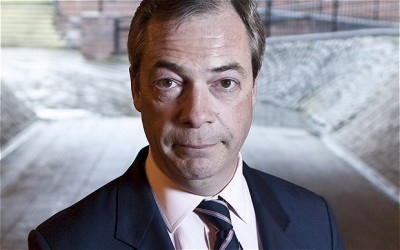UK Independence Party Leader Nigel Farage, Bombast and the US-British Relationship

“In Washington Lord Halifax Once whispered to Lord Keynes: It’s true they have the money bags, But we have all the brains.— Anonymous verse, noted in Richard N. Gardner, Sterling-dollar diplomacy in current perspective (1980), xiii.
Never accuse the former leader of the UK Independence Party (UKIP) of being shy. In recent days, Nigel Farage has been reiterating to followers and press outlets that his party was instrumental in electing Donald Trump as US president. Very cocksure is old Farage, and it was confidence that did get a boost from a personal endorsement from Donald Trump that he be appointed Britain’s ambassador to the United States.
“The result of [the EU] referendum has certainly been pretty seismic in terms of British politics. But I think I would argue it may just have had a bit of an effect on the other side of the Atlantic.”[1] This, according to Farage, reversed the usual tendency of New York catching the cold, with London sneezing in response. This time, it was London making New York noses run.
This particular observation is amusing on one level, reminiscent of stages in the US-British relationship when the shaded empire, diminishing before the growth of Washington, longed to be recognised as important. Those in power always hate retiring.
In recent times, students of that relationship have seen the intimacy of the moment forged in the blood and desperation of the Second World War, when a visiting President Franklin D. Roosevelt chanced upon Prime Minister Winston Churchill emerging from the bath soon after the attack on Pearl Harbour. “The Prime Minister of Great Britain,” came the response from Churchill, “has nothing to conceal from the President of the United States.”
What has mattered over the years is the desire, on the part of anxious British policy makers, to convince their US counterparts about the wisdom of their ways. Empire, being their rehearsed and practised domain, was always going to be something to offer in terms of experience.
The current brain box of Britannia, despite failing in Iraq and Afghanistan, is still considered full, happy to offer wise words in a tumultuous, crisis ridden world. That particular cerebral element proved lacking in 1956, when Anglo-French ambitions over the Suez Canal were thwarted by rank US disapproval. And it refused to come to the rescue of the US intervention in Indochina. Such is the nature of these relationships, being at times brutal and indifferent.
The long held strategy of Britain’s policy wonks was laid out, to some degree, in September 1917, with the US freshly engaged in the killing fields of Europe. Lord Robert Cecil’s memorandum expressed the hope that policy makers in Washington would, in time, see the ways of British policy. There was “undoubtedly a difference between the British and Continental view in international matters”; if the United States were to accept “our point of view in these matters, it will mean the dominance of that point of view in all international affairs.”
What developed was the conscious creation of a myth, not so much from the US side of the bargain as a “deliberate British creation,” to use David Reynolds’ terms words, one “invented as a tool of diplomacy” (International Affairs, 1985-6).
Farage has been the latest flicker in this trend of common thought, another fawning builder of the transatlantic relationship. Both Farage and Trump insisted on rubbishing an Establishment deaf and even dumb to populism – for Farage, exiting the European Union, for Trump, the smug, bruising those conceited dynastic powers of the Bush and Clinton families. Both electoral aggressors won their victories against the tide of conformism and the polls.
Farage made his excitement for Trump known by venturing across the pond to the United States. He turned up to Trump rallies. He spoke about Britain’s “independence day”. This has become something of a pastime, an attempt to internationalise his local efforts. Claiming in big-headed fashion to have secured Trump the White House, he now wishes to achieve similar feats for France’s National Front leader Marine Len Pen.
What threw Farage deeper into the news was the suggestion by Trump that he would, in fact, make a good ambassador to the United States. On Twitter, which has become the first organ of finger itchy communication, Trump expressed the view that, “Many people would like to see [@Nigel_Farage] represent Great Britain as their Ambassador to the United States. He would do a great job!”[2]
Despite this aside, Twitter has, as yet, to constitute a formal means of appointing ambassadors between the UK and the US. “There is no vacancy,” came the response form a Downing Street spokesman, a point reiterated by Foreign Secretary Boris Johnson. “We already have an excellent ambassador to the US.”[3]
Even establishment papers looked with some favour on the Farage-Trump play on ambassadorship. Tim Stanley of The Telegraph suggested that the terrain had so dramatically changed, it was perfectly in order. “We have to ask ourselves what we want in this brave new world of conservative populism. The bromance between Farage and Trump offers opportunities.”[4]
For all of Farage’s confidence, Britain has over the years become even less of an aircraft carrier for the United States. While the Anglophone tunes continue being played to an empty concert hall, with the Brexiteers keen, on some level, to come even closer to the United States, there is no such state of affairs. Britain will continue to do Washington’s bidding – for peanuts. The US, in turn, will do what every hegemon does: dictate terms, and make concessions when required.
Dr. Binoy Kampmark was a Commonwealth Scholar at Selwyn College, Cambridge. He lectures at RMIT University, Melbourne. Email: [email protected]
Notes

